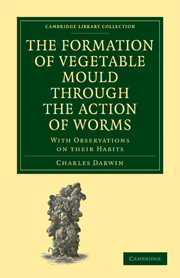Book contents
- Frontmatter
- Contents
- INTRODUCTION
- CHAPTER I HABITS OF WORMS
- CHAPTER II HABITS OF WORMS—continued
- CHAPTER III THE AMOUNT OF FINE EARTH BROUGHT UP BY WORMS TO THE SURFACE
- CHAPTER IV THE PART WHICH WORMS HAVE PLAYED IN THE BURIAL OF ANCIENT BUILDINGS
- CHAPTER V THE ACTION OF WORMS IN THE DENUDATION OF THE LAND
- CHAPTER VI THE DENUDATION OF THE LAND—continued
- CHAPTER VII CONCLUSION
- INDEX
CHAPTER VII - CONCLUSION
Published online by Cambridge University Press: 29 August 2010
- Frontmatter
- Contents
- INTRODUCTION
- CHAPTER I HABITS OF WORMS
- CHAPTER II HABITS OF WORMS—continued
- CHAPTER III THE AMOUNT OF FINE EARTH BROUGHT UP BY WORMS TO THE SURFACE
- CHAPTER IV THE PART WHICH WORMS HAVE PLAYED IN THE BURIAL OF ANCIENT BUILDINGS
- CHAPTER V THE ACTION OF WORMS IN THE DENUDATION OF THE LAND
- CHAPTER VI THE DENUDATION OF THE LAND—continued
- CHAPTER VII CONCLUSION
- INDEX
Summary
Worms have played a more important part in the history of the world than most persons would at first suppose. In almost all humid countries they are extraordinarily numerous, and for their size possess great muscular power. In many parts of England a weight of more than ten tons (10,516 kilogrammes) of dry earth annually passes through their bodies and is brought to the surface on each acre of land; so that the whole superficial bed of vegetable mould passes through their bodies in the course of every few years. From the collapsing of the old burrows the mould is in constant though slow movement, and the particles composing it are thus rubbed together. By these means fresh surfaces are continually exposed to the action of the carbonic acid in the soil, and of the humus-acids which appear to be still more efficient in the decomposition of rocks. The generation of the humus-acids is probably hastened during the digestion of the many half-decayed leaves which worms consume. Thus the particles of earth, forming the superficial mould, are subjected to conditions eminently favourable for their decomposition and disintegration. Moreover, the particles of the softer rocks suffer some amount of mechanical trituration in the muscular gizzards of worms, in which small stones serve as mill-stones.
The finely levigated castings, when brought to the surface in a moist condition, flow during rainy weather down any moderate slope; and the smaller particles are washed far down even a gently inclined surface. Castings when dry often crumble into small pellets and these are apt to roll down any sloping surface.
- Type
- Chapter
- Information
- The Formation of Vegetable Mould through the Action of WormsWith Observations on their Habits, pp. 305 - 314Publisher: Cambridge University PressPrint publication year: 2009First published in: 1881



